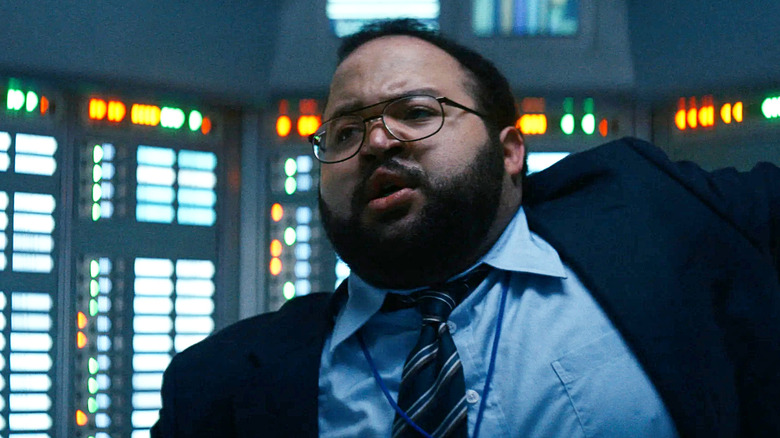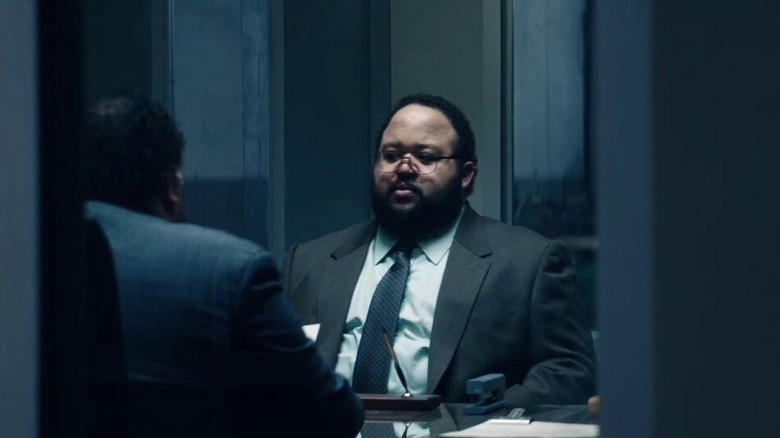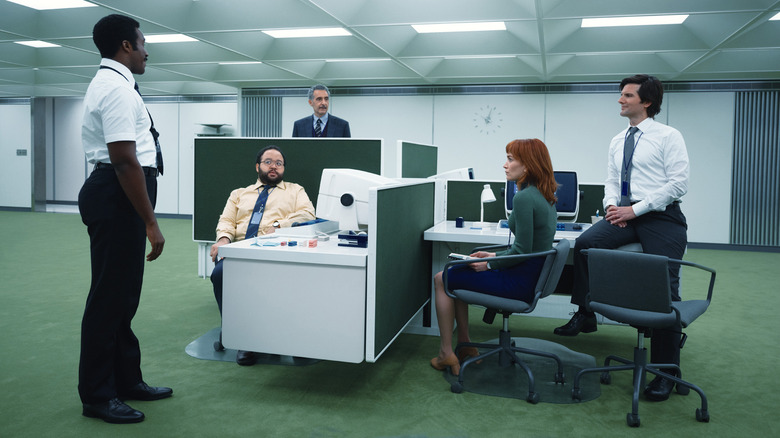On Dan Erickson’s strange corporate dystopia series “Severance,” the main characters have all undergone a medical procedure that allows them to “sever” their work lives from their home lives. A chip implanted in their brains suppresses all their memories of the outside world when they step into the office, and then suppresses all memories of the office when they exit back into the world. The four lead characters of “Severance” work for a mysterious company called Lumon Industries, and no one is wholly sure what Lumon does. Outside of Lumon, the four main characters don’t know each other. Inside, though, they become friends and co-conspirators.
Advertisement
One of these four core characters is Dylan (Zach Cherry), a foulmouthed and confident team-player who, when we first meet him, is eager to collect gold stars and reward points for strange, minor prizes in the office; sometimes Lumon will throw sterile dance parties for the macrodata refinement team. Dylan, however, like his co-workers (played by Adam Scott, Britt Lower, and John Turturro), eventually makes moves to uncover mysterious Lumon malfeasance.
In the show’s second season, Dylan’s “Outie” is briefly fired from Lumon due to the actions of his “innie.” During his ensuing job hunt, Dylan goes for an interview at a door factory in town, hoping to become a mid-manager. He is rejected, however, when the door factory manager learns that he had previously been severed at his last job.
Advertisement
As bizarre as the scene might seem, Dylan’s door factory interview was based on a very real job that “Severance” creator Dan Erickson once held. Indeed, Erickson has said in an interview with IndieWire, that he started to come up with the idea for “Severance” while working at the door factory.
Dan Erickson came up with Severance while working at a door factory
Erickson said that there was nothing insidious or evil about working at a door factory, but he did find the monotony of the job to be a little insufferable. In his words:
“I was working at a company that makes and distributes doors and gates in the greater Los Angeles area — really, really was grateful to have a job, and it was a small business run by good people. But I had finished grad school, I had come here, I’d gotten the first Craigslist job I [found]. It wasn’t what I wanted to do, and it was kind of mind-numbing work a lot of the time. The idea for the script came because I was walking into work one day and just found myself wishing that I could skip the next eight hours entirely, and I could just disassociate.”
Advertisement
That got him thinking about a fantastical conceit that would allow him to work eight hours a day without having to think about it. How keen it would be if he could step into the office, blink, and then step out again immediately, magically having been productive (and paid) for a full shift. What if he could have his mind “severed” from work somehow? Erickson admitted that it was somewhat depressive and twisted to wish that you couldn’t remember eight hours of every day, but he also felt that it would make for a great story. He immediately began writing his fantasy into a script, tweaking it here and there over the course of several years. “Severance” began to emerge.
Erickson eventually left his job at the door factory, moving into other corporate office jobs — which also informed “Severance.”
Advertisement
Lumon’s corporate attitudes and language came from Erickson’s other jobs
Erickson used scenes from his proto-“Severance” script as a writing sample while looking for other creative gigs around Los Angeles. To make ends meet, he worked as an office wonk, and got to know the fineries of interoffice corporate culture. Anyone who has worked an office job for a large corporation knows about the eerie, near-sacred, self-aggrandizing language such companies can use to described themselves and, perhaps, motivate their employees. Erickson said that those office jobs were amalgamated into Lumon. As he put it:
Advertisement
“During most of that time, I was working in a string of office jobs, and one of them in particular was at a company that was a big international chain. That’s where a lot of the sort of corporate doublespeak came from, and the weird core values and stuff like that that ended up permeating the show.”
Dylan, then, is the closest analog the series has to Erickson, in that he’s subjected to corporate doublespeak while at Lumon, and also has a brief dalliance with a door factory. More than anything, though, “Severance” is a criticism of corporate culture, and how so many companies demand not just hard work, but a weird sense of loyalty from their charges. Lumon is going one step beyond by taking full control of the people in their offices, knowing that they literally have no lives outside the office (as far as they can remember).
Advertisement
“Severance” just completed its second season on Apple TV+. Star Adam Scott (an MTV vet from way back) is a shoo-in for an Emmy.











